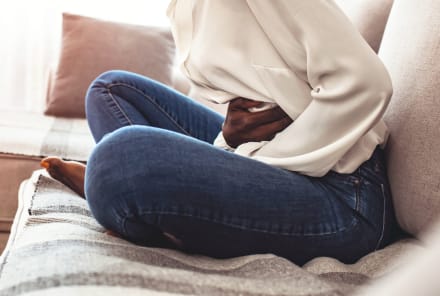Advertisement
Everything You Need To Know About REM Sleep & How To Get Enough Of It


When you check your high-tech sleep tracker in the morning, it might let you know that you were light on rapid eye movement (REM) sleep the night prior. Cue the panic.
But is a lack of REM a true cause for concern, and how much REM sleep do you need each night, anyway? We tapped sleep experts to find out the recommended amount of time you should spend in this stage and why it's so important for your well-being.
What is REM sleep & why is it important?
As you snooze, you'll repeatedly cycle through four stages of sleep, each of which is linked with specific brain waves and neuron activity.
The first three stages are non-REM sleep, and the final stage is REM sleep, which first occurs roughly 90 to 120 minutes after you first fall asleep, says Nishi Bhopal, M.D., a board-certified integrative psychiatrist and sleep specialist.
The first REM period might be just 10 minutes long, but as the night goes on, REM sleep gets progressively longer. By the end of your sleep cycle, your REM stage might be as long as an hour, says Bhopal.
During REM sleep, your brain wave activity, heart rate, and blood pressure are similar to when you're awake. Your breathing will quicken, and your eyes will move rapidly (hence the name), per the NIH.
This sleep stage is particularly important for emotional regulation, says Bhopal. "When people aren't getting enough sleep, and if their REM sleep is disrupted, it can lead to emotional dysregulation during the day," she notes.
This sleep stage also plays a key role1 in memory consolidation, says Marc Milstein, Ph.D., a brain health expert and the author of The Age-Proof Brain.
"When you learn something new, your brain cells make this synaptic connection—that's where the new thing you learned is stored," Milstein explains. "So at night during REM sleep, your brain finds those new connections, and the electricity that's running over and throughout your brain is making those connections stronger. So REM sleep…basically solidifies the memories that you learned that day."
Most vivid dreams with complex storylines also occur during REM sleep, adds Bhopal. As you dream, your brain is strengthening the connections you learned that day and deprioritizing the connections that are no longer important, adds Milstein.
When you don't get enough REM sleep, you may have more trouble with your memory and recall, says Bhopal; animal studies suggest that depriving REM sleep may impair memory formation during complex tasks, according to research published in Physiological Reviews2.
Summary
How much REM sleep you need by age
So, how much REM sleep do you need each night to support those essential processes? It all depends on your age.
Infants spend up to 50% of their sleeping time in REM, says Bhopal. "They're taking in so much information during the day that they get a lot higher percentage of REM sleep than we do as adults," she explains. "They need that for their brains to grow and to function optimally and to also consolidate all the information that they're learning."
As you get into your adolescence, the ideal amount of REM sleep starts to decrease and then stabilize. In general, healthy adults need to spend 20 to 25% of their time asleep in the REM stage, says Bhopal. If you're getting the recommended seven to nine hours of sleep, that equates to roughly 90 to 135 minutes of REM sleep throughout the night.
Older adults (65 and up) might need a bit less REM sleep, but it's still around 20% of total sleep, she adds.
- Infants: 50% of sleep time
- Adults: 20-25% of sleep time
- Older adults: 20% of sleep time
How to get more REM sleep every night
One in three adults in the U.S. isn't getting enough sleep each day, according to the NIH. And that overall sleep deprivation will affect all stages of sleep.
"People ask me, 'How can I get more REM sleep?'" says Bhopal. "What I tell them is that there's not one stage that's better than another—we want to get all of our stages in the right proportion across the night."
If you're already snoozing for the recommended amount of time, the advice to get more REM sleep is practically the same guidance as how to get better sleep.
Have consistent bedtimes and wake times
Going to bed and waking up at a different time each day can worsen sleep quality3 and impact your REM sleep, says Bhopal.
Research shows4 that regular sleepers tend to have increased time in REM sleep compared to irregular sleepers, whose sleep and wake times vary by two to four hours each day.
Plus, circadian misalignment (when your internal circadian clock is out of sync with your wake and sleep schedules) has been linked with short REM sleep cycles during the second half of the night, and a phase advance (moving your bedtime and wake-up times earlier in the day) has been found to decrease REM sleep, according to a small study published in PLoS One5. To get enough REM sleep, make sure to stick to a sleep schedule.
Limit alcohol (and maybe caffeine)
Alcohol has been shown to disrupt6 REM sleep, and caffeine has been found to interrupt7 sleep as a whole, especially if you're very sensitive to its effects, says Bhopal.
Caffeine has a half-life of six to seven hours, but for some people, its effects can last even longer than that, she explains. That's why most people are best off avoiding caffeinated beverages after noon, she notes.
Similarly, your last alcoholic drink should be three to five hours before bedtime. "Even if you had alcohol earlier in the day, it can still disrupt REM sleep," says Bhopal. "These are kind of rules of thumb, but I really recommend to people to pay attention to their body and see how these substances affect them personally."
Practice good sleep hygiene
Getting enough physical activity throughout the day, exposing yourself to sunlight in the morning, and keeping your naps short can all help improve sleep quality and, in turn, your REM sleep, says Bhopal. It's also important to give yourself time to unwind from the day.
"People will be super busy during the day and then they expect they should be able to fall asleep immediately—it just doesn't work that way," Bhopal explains. "You have to give yourself time in the evening to wind down."
Set your bedroom up for sleep quality
To ensure you're getting deep sleep, you should turn off your phone, TV, and, surprisingly, your clock, says Milstein.
By looking at the time, "your brain is trying to keep up with, 'Oh no, I only have five or four hours left,''" he explains. "Constantly checking the clock just makes you so anxious that you have trouble sleeping or getting back to sleep."
You'll also want to create as dark of a bedroom as possible, he suggests. Use dark curtains or blackout shades when possible, or wear a sleep mask.
"There was a study that found that people who just cover their eyes at night perform better on a memory task," says Milstein. "You're giving your brain probably higher-quality REM sleep because not being interrupted by all the ambient light."
Be gentle with yourself
It's easy to feel frustrated about a lack of REM sleep or total sleep, but the more you try to force it, the harder it becomes, says Bhopal.
"Don't worry about getting a perfect night of sleep every single night," she explains. "That simply isn't possible—sleep is going to fluctuate. The nature of it is that some days it's going to be a little bit more restful, and some days you might not get quite enough sleep, and that's OK."
Can you get too much REM sleep?
Generally, if you're getting enough high-quality sleep regularly, you'll get the right proportions of each of the four sleep stages, including REM sleep, says Bhopal.
However, if you're sleeping more than nine hours a night, it's possible to get too much REM sleep, adds Milstein. In that case, "we would be concerned about too much sleep in general," he notes. "It can raise the risk8 for things like depression; it could be a sign of depression; it could be [because] somebody's not getting outside enough or not exercising enough. For some people, more than nine is completely OK, but you want to double-check [with your health care provider]."
In some cases, REM rebound is possible, says Bhopal. For example, a person with sleep apnea (a condition that can reduce the amount of time9 spent in the REM stage) who begins to receive treatment may experience prolonged periods of REM sleep. Now that they can sleep through the night, their brain will try to make up for the REM sleep they lost before treatment, she explains.
Most often, though, you don't need to worry about getting too much REM sleep. "Usually, it's the other way around—people aren't getting quite enough," says Bhopal.
Summary
Measuring REM sleep
The most accurate way of measuring REM sleep is with an EEG (aka electroencephalogram), a test that directly assesses your brainwaves, says Bhopal. This is typically done during an overnight sleep study in a lab, she explains, so it's not necessarily the most accessible method.
Sleep trackers can also measure your REM sleep by tracking variables such as heart rate, movement, and temperature as you snooze. But these gadgets tend to over or underestimate the amount of time you spend in each sleep stage, says Bhopal. Plus, the stats trackers provide could do more harm than good for some people.
The best at-home REM sleep measurement may simply be how you feel.
"We're actually seeing an increased incidence of people having anxiety over not getting enough sleep," adds Milstein. "They're like, 'Oh no, I'm not getting enough REM sleep. I know it's so important because my device is telling me this, and now I can't sleep because I'm so worried about it.' It can be a bit of a vicious cycle."
So, the best at-home REM sleep measurement may simply be how you feel. Bhopal suggests asking yourself a few questions: Do you feel rested after a night of sleep? Do you feel like you're functioning well during the day? Do you feel like you're able to regulate your emotions, that you're not too irritable or snappy, and that you're not making careless mistakes at work due to a lack of sleep? If you answer yes, there's a good chance you're getting enough sleep, including REM sleep.
FAQ
Is 2 hours of REM sleep too much?
The average person needs about seven to nine hours of sleep each night, 20 to 25% of which is spent in REM sleep. So long as you're not oversleeping, two hours is right on target.
How much deep sleep do you need?
Deep sleep occurs in stage 3 of the sleep cycle, one step before REM sleep, according to the NIH. During this period, your body repairs and rebuilds tissue, builds bone and muscle, and strengthens your immune system, and about 25% of your total sleep is spent in this stage, per the National Library of Medicine.
Is 30 minutes of REM sleep enough?
A half-hour of REM sleep isn't enough to support memory consolidation and emotional regulation. In general, you'll need at least 84 minutes of REM sleep if you're snoozing seven hours each night.
The takeaway
So, how much REM sleep do you need? As an adult, you'll want to spend about 20 to 25% of your total sleep in that stage. The good news: So long as you're getting enough high-quality sleep each night, you're likely getting enough REM sleep, which is essential for memory consolidation and emotional regulation.
However, if you still don't feel well-rested after getting the recommended amount of sleep, don't be afraid to reach out to a sleep specialist, says Bhopal. "Sleep issues are highly treatable, so don't delay it."
9 Sources
- https://link.springer.com/article/10.1007/s40675-021-00204-3
- https://www.ncbi.nlm.nih.gov/pmc/articles/PMC3768102/
- https://www.ncbi.nlm.nih.gov/pmc/articles/PMC2718885/
- https://www.ncbi.nlm.nih.gov/pmc/articles/PMC5468315/
- https://www.ncbi.nlm.nih.gov/pmc/articles/PMC3738551/
- https://www.ncbi.nlm.nih.gov/pmc/articles/PMC5821259/
- https://www.ncbi.nlm.nih.gov/pmc/articles/PMC6292246/
- https://www.ncbi.nlm.nih.gov/pmc/articles/PMC10017495/
- https://www.ncbi.nlm.nih.gov/books/NBK526132/
Watch Next
Enjoy some of our favorite clips from classes
Enjoy some of our favorite clips from classes
What Is Meditation?
Mindfulness/Spirituality | Light Watkins
Box Breathing
Mindfulness/Spirituality | Gwen Dittmar
What Breathwork Can Address
Mindfulness/Spirituality | Gwen Dittmar
The 8 Limbs of Yoga - What is Asana?
Yoga | Caley Alyssa
Two Standing Postures to Open Up Tight Hips
Yoga | Caley Alyssa
How Plants Can Optimize Athletic Performance
Nutrition | Rich Roll
What to Eat Before a Workout
Nutrition | Rich Roll
How Ayurveda Helps Us Navigate Modern Life
Nutrition | Sahara Rose
Messages About Love & Relationships
Love & Relationships | Esther Perel
Love Languages
Love & Relationships | Esther Perel
What Is Meditation?
Box Breathing
What Breathwork Can Address
The 8 Limbs of Yoga - What is Asana?
Two Standing Postures to Open Up Tight Hips
How Plants Can Optimize Athletic Performance
What to Eat Before a Workout
How Ayurveda Helps Us Navigate Modern Life
Messages About Love & Relationships
Love Languages
Advertisement

Yes, There's A Longevity Vitamin (& People Over 40 Need To Prioritize It)
Molly Knudsen, M.S., RDN

Study Investigates How Fasting Impacts Sleep, Hormone Health & More
Gretchen Lidicker, M.S.

Yes, There's A Longevity Vitamin (& People Over 40 Need To Prioritize It)
Molly Knudsen, M.S., RDN

Study Investigates How Fasting Impacts Sleep, Hormone Health & More
Gretchen Lidicker, M.S.

Yes, There's A Longevity Vitamin (& People Over 40 Need To Prioritize It)
Molly Knudsen, M.S., RDN

Study Investigates How Fasting Impacts Sleep, Hormone Health & More
Gretchen Lidicker, M.S.

Yes, There's A Longevity Vitamin (& People Over 40 Need To Prioritize It)
Molly Knudsen, M.S., RDN

Study Investigates How Fasting Impacts Sleep, Hormone Health & More
Gretchen Lidicker, M.S.














